13 sept 2018
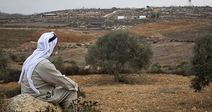
Unemployment in the occupied Palestinian territory rose to more than 27 percent in 2017, the world's highest, while per head income contracted 11 percent, the UN Conference on Trade and Development (UNCTAD) said in its annual report.
The per head income declined along with agricultural production shrinking by 11 percent, as socioeconomic conditions in the past year worsened, UNCTAD said in it its yearly report on its assistance to the Palestinian people.
"Economic prospects are bleak due to risky political horizons and unfavorable trends in aid, Gaza's reconstruction and credit-financed expansion in consumption," said the executive summary of the report.
The report also notes that the adverse conditions imposed by Israeli occupation disproportionately affected women and young people.
"Poor economic performance is caused by restrictive measures imposed by the occupying power," said the report in reference to Israel.
It warns that declining donor support, a freeze in the reconstruction of Gaza and unsustainable, credit-financed public and private consumption paint a bleak picture for future growth.
Prospects for the Palestinian economy are further clouded by the ongoing confiscation of land and natural resources by Israel.
"Under international law, Israel and the international community have responsibilities not only to avoid actions that impede development but to take affirmative steps to foster development in the Occupied Palestinian Territory," said Mahmoud Elkhafif, Coordinator of the UNCTAD Assistance to the Palestinian People Unit.
However, the report said Israel has failed to ease restrictions and donor support has declined steeply to one-third of its 2008 level.
Incremental annexation in the West Bank and expansion of illegal settlements accelerated in 2017 and 2018 despite a UN General Assembly resolution in December 2017.
The report highlights evidence of incremental annexation of large parts of the West Bank that includes the transfer of Israeli population into settlements, the forcing out of the Palestinian population, investment of more than 19 billion U.S. dollars in the construction of settlements.
Turning to a blockade Israel has on Gaza, the report said this is now in its 11th year and "the Gaza Strip has been reduced to a humanitarian case of profound suffering and aid dependency," the report says.
Gaza's productive capacity has been stripped by three major military operations and a crippling air, sea and land blockade.
The 2008-2009 Israeli military operation erased more than 60 percent of Gaza's total stock of productive capital, and the 2014 strike destroyed 85 percent of what was left.
According to the report, destroyed productive assets include roads, power stations, industrial and commercial establishments, and agricultural land, as well as other infrastructure and related assets.
In 2012, the UN warned that unless ongoing trends were reversed, Gaza would become uninhabitable and unfit for humans to live in by 2020.
Since then, the report says, all socioeconomic indicators have deteriorated and conditions in Gaza are now worse.
The per head income declined along with agricultural production shrinking by 11 percent, as socioeconomic conditions in the past year worsened, UNCTAD said in it its yearly report on its assistance to the Palestinian people.
"Economic prospects are bleak due to risky political horizons and unfavorable trends in aid, Gaza's reconstruction and credit-financed expansion in consumption," said the executive summary of the report.
The report also notes that the adverse conditions imposed by Israeli occupation disproportionately affected women and young people.
"Poor economic performance is caused by restrictive measures imposed by the occupying power," said the report in reference to Israel.
It warns that declining donor support, a freeze in the reconstruction of Gaza and unsustainable, credit-financed public and private consumption paint a bleak picture for future growth.
Prospects for the Palestinian economy are further clouded by the ongoing confiscation of land and natural resources by Israel.
"Under international law, Israel and the international community have responsibilities not only to avoid actions that impede development but to take affirmative steps to foster development in the Occupied Palestinian Territory," said Mahmoud Elkhafif, Coordinator of the UNCTAD Assistance to the Palestinian People Unit.
However, the report said Israel has failed to ease restrictions and donor support has declined steeply to one-third of its 2008 level.
Incremental annexation in the West Bank and expansion of illegal settlements accelerated in 2017 and 2018 despite a UN General Assembly resolution in December 2017.
The report highlights evidence of incremental annexation of large parts of the West Bank that includes the transfer of Israeli population into settlements, the forcing out of the Palestinian population, investment of more than 19 billion U.S. dollars in the construction of settlements.
Turning to a blockade Israel has on Gaza, the report said this is now in its 11th year and "the Gaza Strip has been reduced to a humanitarian case of profound suffering and aid dependency," the report says.
Gaza's productive capacity has been stripped by three major military operations and a crippling air, sea and land blockade.
The 2008-2009 Israeli military operation erased more than 60 percent of Gaza's total stock of productive capital, and the 2014 strike destroyed 85 percent of what was left.
According to the report, destroyed productive assets include roads, power stations, industrial and commercial establishments, and agricultural land, as well as other infrastructure and related assets.
In 2012, the UN warned that unless ongoing trends were reversed, Gaza would become uninhabitable and unfit for humans to live in by 2020.
Since then, the report says, all socioeconomic indicators have deteriorated and conditions in Gaza are now worse.
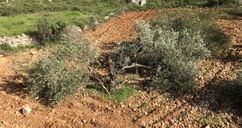
Israeli settlers on Thursday burned dozens of olive trees in Minya town, south of Bethlehem in occupied West Bank.
According to Quds Press, Israeli settlers torched olive trees planted on Palestinian land belonging to Matur family.
The Palestinian locals were shocked as they caught sight of 200 of olive trees reduced to ashes as preparations for olive-picking got underway in the occupied territories.
According to Quds Press, Israeli settlers torched olive trees planted on Palestinian land belonging to Matur family.
The Palestinian locals were shocked as they caught sight of 200 of olive trees reduced to ashes as preparations for olive-picking got underway in the occupied territories.

Israelis residing in the Atz Afraim outpost continue to level Palestinian lands in Mesha village, west of Salfit, to expand illegal settlement.
Eye-witnesses said Israeli settlers have been bulldozing Palestinian lands to establish new facilities in the area.
The occupation authorities continue to prevent Palestinian farmers from entering their land lots behind the apartheid wall.
Researcher Khaled Maali said four Israeli settlements engulf Mesha village after they were built on private Palestinian land in the area.
Eye-witnesses said Israeli settlers have been bulldozing Palestinian lands to establish new facilities in the area.
The occupation authorities continue to prevent Palestinian farmers from entering their land lots behind the apartheid wall.
Researcher Khaled Maali said four Israeli settlements engulf Mesha village after they were built on private Palestinian land in the area.
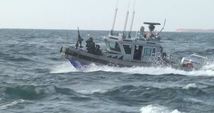
Israeli navy ships attacked, Thursday, a Palestinians fishing boat in Gaza territorial waters, abducted three fishermen and confiscated their boat.
Zakariya Bakr, a Palestinian fisherman who witnessed the attack, said the Israeli navy boats chased a small boat with three fishermen on board, near the shore of Gaza Sea, and fired many live rounds at them.
He added that the navy abducted the three fishermen, identified as the boat owner, Mohammad Abdul-Razeq Bakr, in addition Omran Mohammad Bakr, and Mohammad Mohammad Bakr.
The three fishermen, and their boat, were taken to an unknown destination.
The attack is part of ongoing Israeli violations against the Palestinians in the besieged and improvised Gaza Strip.
3 Gaza fishermen detained by Israeli navy, boat seized
The Israeli occupation navy arrested on Thursday three Palestinian fishermen and seized their vessel while sailing off Gaza’s seashore.
Israeli navy chased down a fishing boat before they arrested three fishermen on board and misappropriated the vessel.
The arrestees were identified as: Mohamed Abdul Razaq Bakr, Mohamed Mohamed Bakr, and Omran Bakr.
The occupation navy steered the boat to an unknown destination.
Palestinian fishermen setting sail in Gaza’s seashore have been the permanent targets of shooting attacks and arbitrary arrests carried out by the Israeli navy on a quasi-daily basis.
Zakariya Bakr, a Palestinian fisherman who witnessed the attack, said the Israeli navy boats chased a small boat with three fishermen on board, near the shore of Gaza Sea, and fired many live rounds at them.
He added that the navy abducted the three fishermen, identified as the boat owner, Mohammad Abdul-Razeq Bakr, in addition Omran Mohammad Bakr, and Mohammad Mohammad Bakr.
The three fishermen, and their boat, were taken to an unknown destination.
The attack is part of ongoing Israeli violations against the Palestinians in the besieged and improvised Gaza Strip.
3 Gaza fishermen detained by Israeli navy, boat seized
The Israeli occupation navy arrested on Thursday three Palestinian fishermen and seized their vessel while sailing off Gaza’s seashore.
Israeli navy chased down a fishing boat before they arrested three fishermen on board and misappropriated the vessel.
The arrestees were identified as: Mohamed Abdul Razaq Bakr, Mohamed Mohamed Bakr, and Omran Bakr.
The occupation navy steered the boat to an unknown destination.
Palestinian fishermen setting sail in Gaza’s seashore have been the permanent targets of shooting attacks and arbitrary arrests carried out by the Israeli navy on a quasi-daily basis.
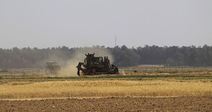
Israeli army bulldozers on Thursday morning infiltrated into a Gaza border area, while Israeli gunboats opened fire at fishing boats off the northern coast of Gaza.
Local residents reported seeing two military bulldozers leaving an army post known as Sufa and advancing towards in a border area in Rafah city, south of Gaza.
Every once in a while, such bulldozers enter border areas in Gaza and embark on leveling tracts of land.
In a separate incident, Israeli gunboats at dawn opened machinegun fire at fishing boats during their presence within three nautical miles off the shores of al-Sudaniya area in northern Gaza.
The intensity of shooting forced the fishermen to return ashore.
Local residents reported seeing two military bulldozers leaving an army post known as Sufa and advancing towards in a border area in Rafah city, south of Gaza.
Every once in a while, such bulldozers enter border areas in Gaza and embark on leveling tracts of land.
In a separate incident, Israeli gunboats at dawn opened machinegun fire at fishing boats during their presence within three nautical miles off the shores of al-Sudaniya area in northern Gaza.
The intensity of shooting forced the fishermen to return ashore.
12 sept 2018
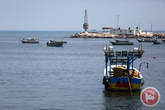
Israeli naval forces opened fire on a number of Palestinian fishing boats off the northern coast of the besieged Gaza Strip, on Wednesday morning.
A Ma'an reporter said that Israeli naval boats opened fire at fishing boats in northern Gaza, forcing Palestinian fishermen to sail back to shore.
No injuries were reported from the incident.
The Israeli army regularly detains and opens fire on unarmed Palestinian fishermen, shepherds and farmers along the border areas if they approach the unilaterally declared buffer zone.
Israeli human rights group B'Tselem confirmed that Israel's Gaza closure and "harassment of fishermen" have been "destroying Gaza's fishing sector," with 95 percent of fishermen living below the poverty line.
Meanwhile, Israeli forces opened fire at a group of Palestinian youths near the return camps east of Gaza City. No injuries were reported.
A Ma'an reporter said that Israeli naval boats opened fire at fishing boats in northern Gaza, forcing Palestinian fishermen to sail back to shore.
No injuries were reported from the incident.
The Israeli army regularly detains and opens fire on unarmed Palestinian fishermen, shepherds and farmers along the border areas if they approach the unilaterally declared buffer zone.
Israeli human rights group B'Tselem confirmed that Israel's Gaza closure and "harassment of fishermen" have been "destroying Gaza's fishing sector," with 95 percent of fishermen living below the poverty line.
Meanwhile, Israeli forces opened fire at a group of Palestinian youths near the return camps east of Gaza City. No injuries were reported.
10 sept 2018
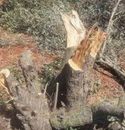
A number of Israeli colonizers invaded, on Monday morning, a Palestinian olive orchard in the al-Hamra area, east of Yatta town, south of the southern West Bank city of Hebron, and cut at least fifteen trees.
The coordinator of the National and Popular Committees in southern Hebron, Rateb Jabour, told the Palestinian News and Info Agency (WAFA) that the Israeli assailants cut more than fifteen trees, owned by members of Rib’ey family.
Jabour added that the colonizer came from Ma’on and Havat Ma’on colonies, which were illegally built on private Palestinian lands.
He also stated that the attack is part of numerous similar violations over the last several years, and added that the colonists are trying to occupy the lands to build and expand their illegal colonies, and outposts.
Jabour called on national, legal, regional and international organizations and human rights groups, to intervene and help in ending the seriously escalating Israeli violations.
The coordinator of the National and Popular Committees in southern Hebron, Rateb Jabour, told the Palestinian News and Info Agency (WAFA) that the Israeli assailants cut more than fifteen trees, owned by members of Rib’ey family.
Jabour added that the colonizer came from Ma’on and Havat Ma’on colonies, which were illegally built on private Palestinian lands.
He also stated that the attack is part of numerous similar violations over the last several years, and added that the colonists are trying to occupy the lands to build and expand their illegal colonies, and outposts.
Jabour called on national, legal, regional and international organizations and human rights groups, to intervene and help in ending the seriously escalating Israeli violations.
9 sept 2018

Israeli forces opened fire on Sunday on Palestinian farmers in the southern besieged Gaza Strip.
A Ma'an reporter said that Israeli forces opened fire on Palestinian farmers as they were working near the return camps, east of Khan Younis district, in southern Gaza.
Additionally, sources mentioned that south of the Khan Younis district, Israeli forces repeatedly opened fire at farmers for unknown reasons.
No injuries were reported from neither incidents.
The Israeli army regularly detains and opens fire on unarmed Palestinian fishermen, shepherds and farmers along the border areas if they approach the unilaterally declared buffer zone.
As part of Israel's blockade of the coastal enclave since 2007, the Israeli army, citing security concerns, requires Palestinian fishermen to work within a limited "designated fishing zone," the exact limits of which are decided by the Israeli authorities and have historically fluctuated.
A Ma'an reporter said that Israeli forces opened fire on Palestinian farmers as they were working near the return camps, east of Khan Younis district, in southern Gaza.
Additionally, sources mentioned that south of the Khan Younis district, Israeli forces repeatedly opened fire at farmers for unknown reasons.
No injuries were reported from neither incidents.
The Israeli army regularly detains and opens fire on unarmed Palestinian fishermen, shepherds and farmers along the border areas if they approach the unilaterally declared buffer zone.
As part of Israel's blockade of the coastal enclave since 2007, the Israeli army, citing security concerns, requires Palestinian fishermen to work within a limited "designated fishing zone," the exact limits of which are decided by the Israeli authorities and have historically fluctuated.

Officials from Israel’s security establishment have concurred that the Israeli government must work to establish an alternative to the United Nations Relief and Works Agency (UNRWA) in the Gaza Strip to avoid a humanitarian disaster in the impoverished Palestinian enclave.
Israel’s Haaretz daily reported Sunday that Israeli officials concluded in a meeting last week that a substitute must be developed to channel much-needed aid into the blockaded Gaza Strip in order to avoid further deterioration.
The officials noted during the meeting that only three percent of Gaza’s water supply is drinkable and desalination projects are not being advanced rapidly enough to stave off a water crisis. As a result, many Gazan families are storing seawater for household use, Haaretz added.
According to the report, an Israeli delegation will attend a UN donor conference in New York later this month and encourage countries to supply the necessary funding to guarantee the continued delivery of food, education services and the salaries of some 30,000 UNRWA employees in the Strip.
But, in light of the US decision to de-fund the Palestinian aid agency, the Israeli delegation will instead focus on securing funding for the provision of basic needs, Haaretz further stated.
Humanitarian conditions in the blockaded Gaza Strip have steadily declined over the years, exacerbated by a limited power supply and lack of drinkable water.
US President Donald Trump announced at the beginning of this month that Washington would cut almost $300 million in planned funding for the organization which it claimed had become an “irredeemably flawed operation.”
Washington had long been the largest single donor to the agency, supplying nearly 30 percent of the total budget to UNRWA which provides healthcare, education and social service to almost five million Palestinians across the West Bank, Gaza Strip, Jordan, Syria and Lebanon.
Israel’s Haaretz daily reported Sunday that Israeli officials concluded in a meeting last week that a substitute must be developed to channel much-needed aid into the blockaded Gaza Strip in order to avoid further deterioration.
The officials noted during the meeting that only three percent of Gaza’s water supply is drinkable and desalination projects are not being advanced rapidly enough to stave off a water crisis. As a result, many Gazan families are storing seawater for household use, Haaretz added.
According to the report, an Israeli delegation will attend a UN donor conference in New York later this month and encourage countries to supply the necessary funding to guarantee the continued delivery of food, education services and the salaries of some 30,000 UNRWA employees in the Strip.
But, in light of the US decision to de-fund the Palestinian aid agency, the Israeli delegation will instead focus on securing funding for the provision of basic needs, Haaretz further stated.
Humanitarian conditions in the blockaded Gaza Strip have steadily declined over the years, exacerbated by a limited power supply and lack of drinkable water.
US President Donald Trump announced at the beginning of this month that Washington would cut almost $300 million in planned funding for the organization which it claimed had become an “irredeemably flawed operation.”
Washington had long been the largest single donor to the agency, supplying nearly 30 percent of the total budget to UNRWA which provides healthcare, education and social service to almost five million Palestinians across the West Bank, Gaza Strip, Jordan, Syria and Lebanon.

The Israeli occupation forces (IOF) on Saturday prevented Palestinian citizens, for the second consecutive day, from staying in or reaching Salama hamlet, west of al-Khalil.
Local sources told the Palestinian Information Center (PIC) that the IOF on Friday declared the hamlet a closed military zone.
Several citizens from the nearby Palestinian town of Tarqumiyah returned for the second time on Saturday to the hamlet and embarked on cleaning its yards and planting its lands to protect it from being annexed for settlement activity, but Israeli soldiers showed up and forced them to leave, according to the sources.
An 82-year-old citizen suffered from inhaling tear gas when Israeli forces stormed the hamlet and attacked them.
Last month, hordes of Jewish settlers stormed the hamlet several times in an attempt to annex it to their illegal settlement, which is called Telem.
Local sources told the Palestinian Information Center (PIC) that the IOF on Friday declared the hamlet a closed military zone.
Several citizens from the nearby Palestinian town of Tarqumiyah returned for the second time on Saturday to the hamlet and embarked on cleaning its yards and planting its lands to protect it from being annexed for settlement activity, but Israeli soldiers showed up and forced them to leave, according to the sources.
An 82-year-old citizen suffered from inhaling tear gas when Israeli forces stormed the hamlet and attacked them.
Last month, hordes of Jewish settlers stormed the hamlet several times in an attempt to annex it to their illegal settlement, which is called Telem.
Page: 30 - 29 - 28 - 27 - 26 - 25 - 24 - 23 - 22 - 21 - 20 - 19 - 18 - 17 - 16 - 15 - 14 - 13 - 12 - 11 - 10 - 9
